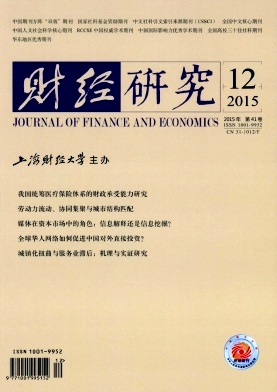全球华人网络如何促进中国对外直接投资?
财经研究 2015 年 第 41 卷第 12 期, 页码:95 - 106
摘要
参考文献
摘要
在中国实施"走出去"的战略布局过程中,制度与文化的交融也是非常重要的,中国与东道国间的制度鸿沟可能是阻碍中国企业对外投资的一个重要因素。现有研究虽已注意到正式制度在其中的作用,但缺乏对非正式制度与文化差异的关注。文章基于制度与文化视角,阐述了海外华人网络影响中国对外直接投资的理论机制,并基于全球195个国家或地区的华人分布数据和中国对全球132个经济体对外直接投资的流量与存量数据,检验了海外华人网络对中国对外直接投资的影响效应和影响途径。研究表明:(1)海外华人网络促进了中国企业"走出去"以实现对外直接投资,中国企业在华人分布密集的地区更容易实现对外直接投资;(2)在海外华人越来越集中于高技能与OECD国家的背景下,高技能华人的网络与OECD国家的华人网络对中国的对外直接投资的影响更为明显;(3)从制度距离的角度来看,海外华人网络在与中国制度距离更远的国家与经济体中的影响更为明显,即海外华人网络能够弥合中国与东道国之间的制度距离而促使中国企业"走出去"。文章对当前我国"走出去"战略推进过程中如何利用好文化与非正式制度因素具有重要的启示。
[1] 蔡冬青,刘厚俊. 中国OFDI反向技术溢出影响因素研究——基于东道国制度环境的视角[J].财经研究,2012,(5):59-69.
[2] 蒋冠宏,蒋殿春. 中国对外投资的区位选择:基于投资引力模型的面板数据检验 [J].世界经济,2012a,(9):21-40.
[3] 蒋冠宏,蒋殿春. 中国对发展中国家的投资——东道国制度重要吗? [J].管理世界,2012b,(11):45-56.
[4] 蒋冠宏,蒋殿春. 中国企业对外直接投资的"出口效应"[J].经济研究,2014,(5):160-173.
[5] 蒋为. 环境规制是否影响了中国制造业企业研发创新?——基于微观数据的实证研究[J].财经研究,2015,(2):76-87.
[6] 毛其淋,许家云. 中国企业对外直接投资是否促进了企业创新[J].世界经济,2014,(8):98-125.
[7] 肖慧敏,刘辉煌. 中国企业对外直接投资的学习效应研究[J].财经研究,2014,(4):42-55.
[8] 王永钦,杜巨澜,王凯. 中国对外直接投资区位选择的决定因素:制度、税负和资源禀赋[J].经济研究,2014,(12):126-142.
[9] 阎大颖,孙黎,谢盈莹,等. 海外华人网络如何影响中国引进外商直接投资:一个经验研究[J].南开经济研究,2013,(2):20-43.
[10] Artuc E, Docquier F, Ozden C,et al. A global assessment of human capital mobility: The role of non-OECD destinations [R]. IRES Discussion Paper No. 2012-022, 2012.
[11] Belderbos R, Sleuwaegen L. Tariff jumping DFI and export substitution: Japanese electronics firms in Europe [J]. International Journal of Industrial Organization, 1998, 16(5): 601-638.
[12] Bénassy-Quéré A, Coupet M, Mayer T, et al. Institutional determinants of foreign direct investment [J]. The World Economy, 2007, 30(5): 764-782.
[13] Di Mauro F. The impact of economic integration on FDI and exports: A gravity approach [R]. CEPS Working Paper, 2000.
[14] Docquier F, Ozden C, Peri G. The labour market effects of immigration and emigration in OECD countries[J]. The Economic Journal, 2014, 124(579): 1106-1145.
[15] Dunning J. International production and the multinational enterprise[M]. London: George,1981.
[16] Dunning J, Narula R. The investment development path revisited: Some emerging issues [A]. Dunning J, Narula R. Foreign direct investment and governments: Catalysts for economic restructuring[C].London: Routledge,1996.
[17] Gao T. Ethnic Chinese networks and international investment:Evidence from inward FDI in China [J]. Journal of Asian Economics, 2003, 14(4): 611-629.
[18] Gould D M. Immigrant links to the home country: Empirical implications for U.S. bilateral trade flows [J]. The Review of Economics and Statistics, 1994, 76(2): 302-316.
[19] Habib M, Zurawicki L. Corruption and foreign direct investment [J]. Journal of International Business Studies, 2002, 33(2): 291-307.
[20] Helpman E, Melitz M J, Yeaple S R. Export verus FDI with heterogeneous firms [J]. American Economic Review, 2004, 94(1): 300-316.
[21] Jarreau J, Poncet S. Export sophistication and economic growth: Evidence from China [J]. Journal of Development Economics, 2012, 97(2): 281-292.
[22] Javorcik B S,Ozden C,Spatarean M,et al.Migrant networks and foreign direct investment [J]. Journal of Development Economics, 2011, 94(2): 231-241.
[23] McKenzie D.Paper wall are easier to tear down: Passport costs and legal barriers to emigration [J]. World Development, 2007, 35(11):2026-2039.
[24] Melitz M J. The impact of trade on intra-industry reallocations and aggregate industry productivity[J]. Econometrica, 2003,71(6): 1695-1725.
[25] Rauch J, Trindade V. Ethnic Chinese networks in international trade [J]. The Review of Economics and Statistics, 2002, 84(1): 116-130.
[2] 蒋冠宏,蒋殿春. 中国对外投资的区位选择:基于投资引力模型的面板数据检验 [J].世界经济,2012a,(9):21-40.
[3] 蒋冠宏,蒋殿春. 中国对发展中国家的投资——东道国制度重要吗? [J].管理世界,2012b,(11):45-56.
[4] 蒋冠宏,蒋殿春. 中国企业对外直接投资的"出口效应"[J].经济研究,2014,(5):160-173.
[5] 蒋为. 环境规制是否影响了中国制造业企业研发创新?——基于微观数据的实证研究[J].财经研究,2015,(2):76-87.
[6] 毛其淋,许家云. 中国企业对外直接投资是否促进了企业创新[J].世界经济,2014,(8):98-125.
[7] 肖慧敏,刘辉煌. 中国企业对外直接投资的学习效应研究[J].财经研究,2014,(4):42-55.
[8] 王永钦,杜巨澜,王凯. 中国对外直接投资区位选择的决定因素:制度、税负和资源禀赋[J].经济研究,2014,(12):126-142.
[9] 阎大颖,孙黎,谢盈莹,等. 海外华人网络如何影响中国引进外商直接投资:一个经验研究[J].南开经济研究,2013,(2):20-43.
[10] Artuc E, Docquier F, Ozden C,et al. A global assessment of human capital mobility: The role of non-OECD destinations [R]. IRES Discussion Paper No. 2012-022, 2012.
[11] Belderbos R, Sleuwaegen L. Tariff jumping DFI and export substitution: Japanese electronics firms in Europe [J]. International Journal of Industrial Organization, 1998, 16(5): 601-638.
[12] Bénassy-Quéré A, Coupet M, Mayer T, et al. Institutional determinants of foreign direct investment [J]. The World Economy, 2007, 30(5): 764-782.
[13] Di Mauro F. The impact of economic integration on FDI and exports: A gravity approach [R]. CEPS Working Paper, 2000.
[14] Docquier F, Ozden C, Peri G. The labour market effects of immigration and emigration in OECD countries[J]. The Economic Journal, 2014, 124(579): 1106-1145.
[15] Dunning J. International production and the multinational enterprise[M]. London: George,1981.
[16] Dunning J, Narula R. The investment development path revisited: Some emerging issues [A]. Dunning J, Narula R. Foreign direct investment and governments: Catalysts for economic restructuring[C].London: Routledge,1996.
[17] Gao T. Ethnic Chinese networks and international investment:Evidence from inward FDI in China [J]. Journal of Asian Economics, 2003, 14(4): 611-629.
[18] Gould D M. Immigrant links to the home country: Empirical implications for U.S. bilateral trade flows [J]. The Review of Economics and Statistics, 1994, 76(2): 302-316.
[19] Habib M, Zurawicki L. Corruption and foreign direct investment [J]. Journal of International Business Studies, 2002, 33(2): 291-307.
[20] Helpman E, Melitz M J, Yeaple S R. Export verus FDI with heterogeneous firms [J]. American Economic Review, 2004, 94(1): 300-316.
[21] Jarreau J, Poncet S. Export sophistication and economic growth: Evidence from China [J]. Journal of Development Economics, 2012, 97(2): 281-292.
[22] Javorcik B S,Ozden C,Spatarean M,et al.Migrant networks and foreign direct investment [J]. Journal of Development Economics, 2011, 94(2): 231-241.
[23] McKenzie D.Paper wall are easier to tear down: Passport costs and legal barriers to emigration [J]. World Development, 2007, 35(11):2026-2039.
[24] Melitz M J. The impact of trade on intra-industry reallocations and aggregate industry productivity[J]. Econometrica, 2003,71(6): 1695-1725.
[25] Rauch J, Trindade V. Ethnic Chinese networks in international trade [J]. The Review of Economics and Statistics, 2002, 84(1): 116-130.
引用本文
吴群锋, 蒋为. 全球华人网络如何促进中国对外直接投资?[J]. 财经研究, 2015, 41(12): 95–106.
导出参考文献,格式为:
上一篇:地方政府干预与企业投资的同伴效应





 8861
8861  4354
4354

